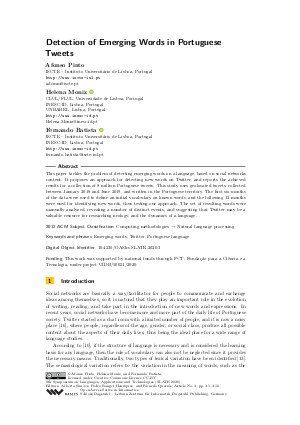Detection of Emerging Words in Portuguese Tweets
Authors
Afonso Pinto,
Helena Moniz  ,
Fernando Batista
,
Fernando Batista 
-
Part of:
Volume:
9th Symposium on Languages, Applications and Technologies (SLATE 2020)
Part of: Series: Open Access Series in Informatics (OASIcs)
Part of: Conference: Symposium on Languages, Applications and Technologies (SLATE) - License:
 Creative Commons Attribution 3.0 Unported license
Creative Commons Attribution 3.0 Unported license
- Publication Date: 2020-09-16
File

PDF
OASIcs.SLATE.2020.3.pdf
- Filesize: 1.33 MB
- 10 pages
Document Identifiers
Subject Classification
ACM Subject Classification
- Computing methodologies → Natural language processing
Keywords
- Emerging words
- Portuguese language
Metrics
- Access Statistics
-
Total Accesses (updated on a weekly basis)
0Document
0Metadata
Abstract
This paper tackles the problem of detecting emerging words on a language, based on social networks content. It proposes an approach for detecting new words on Twitter, and reports the achieved results for a collection of 8 million Portuguese tweets. This study uses geolocated tweets, collected between January 2018 and June 2019, and written in the Portuguese territory. The first six months of the data were used to define an initial vocabulary on known words, and the following 12 months were used for identifying new words, thus testing our approach. The set of resulting words were manually analyzed, revealing a number of distinct events, and suggesting that Twitter may be a valuable resource for researching neology, and the dynamics of a language.
Cite As Get BibTex
Afonso Pinto, Helena Moniz, and Fernando Batista. Detection of Emerging Words in Portuguese Tweets. In 9th Symposium on Languages, Applications and Technologies (SLATE 2020). Open Access Series in Informatics (OASIcs), Volume 83, pp. 3:1-3:10, Schloss Dagstuhl – Leibniz-Zentrum für Informatik (2020)
https://doi.org/10.4230/OASIcs.SLATE.2020.3
BibTex
@InProceedings{pinto_et_al:OASIcs.SLATE.2020.3,
author = {Pinto, Afonso and Moniz, Helena and Batista, Fernando},
title = {{Detection of Emerging Words in Portuguese Tweets}},
booktitle = {9th Symposium on Languages, Applications and Technologies (SLATE 2020)},
pages = {3:1--3:10},
series = {Open Access Series in Informatics (OASIcs)},
ISBN = {978-3-95977-165-8},
ISSN = {2190-6807},
year = {2020},
volume = {83},
editor = {Sim\~{o}es, Alberto and Henriques, Pedro Rangel and Queir\'{o}s, Ricardo},
publisher = {Schloss Dagstuhl -- Leibniz-Zentrum f{\"u}r Informatik},
address = {Dagstuhl, Germany},
URL = {https://drops.dagstuhl.de/entities/document/10.4230/OASIcs.SLATE.2020.3},
URN = {urn:nbn:de:0030-drops-130164},
doi = {10.4230/OASIcs.SLATE.2020.3},
annote = {Keywords: Emerging words, Twitter, Portuguese language}
}
Author Details
- CLUL/FLUL, Universidade de Lisboa, Portugal
- INESC-ID, Lisboa, Portugal
- UNBABEL, Lisboa, Portugal
Funding
This work was supported by national funds through FCT, Fundação para a Ciência e a Tecnologia, under project UIDB/50021/2020.
References
- David Bamman, Jacob Eisenstein, and Tyler Schnoebelen. Gender identity and lexical variation in social media. Journal of Sociolinguistics, 18(2):135-160, 2014. URL: https://doi.org/10.1111/josl.12080.
- Rebecca Blood. Weblogs: A history and perspective, September 2000. URL: http://www.rebeccablood.net/essays/weblog_history.html.
- Charles Boberg. Geolinguistic diffusion and the U.S. - Canada border. Language Variation and Change, 12:1-24, March 2000. URL: https://doi.org/10.1017/S0954394500121015.
- Marilyn Dyrud, Rebecca Worley, and Marie Flatley. Blogging for enhanced teaching and learning. Business Communication Quarterly, 68, March 2005. URL: https://doi.org/10.1177/108056990506800111.
- Alexandre François. Trees, Waves and Linkages: Models of Language Diversification. In Claire Bowern and Bethwyn Evans, editors, The Routledge Handbook of Historical Linguistics, chapter Trees, Waves and Linkages: Models of Language Diversification, pages 161-189. Routledge, London, June 2014. URL: https://doi.org/10.4324/9781315794013.ch6.
- Jonathon Green and David Kendal. Writing and publishing green’s dictionary of slang. Dictionaries: Journal of the Dictionary Society of North America, 38:82-95, January 2017. URL: https://doi.org/10.1353/dic.2017.0003.
- Jack Grieve. Dialect variation. In Douglas Biber and RandiEditors Reppen, editors, The Cambridge Handbook of English Corpus Linguistics, Cambridge Handbooks in Language and Linguistics, pages 362-380. Cambridge University Press, Cambridge (UK), 2015. URL: https://doi.org/10.1017/CBO9781139764377.021.
- Jack Grieve, Andrea Nini, and Diansheng Guo. Analyzing lexical emergence in modern american english online. English Language and Linguistics, 21(1):99–127, 2017. URL: https://doi.org/10.1017/S1360674316000113.
- Stefan Grondelaers, Dirk Geeraerts, and Dirk Speelman. Lexical variation and change. In Dirk Geeraerts and Hubert Cuyckens, editors, The Oxford Handbook of Cognitive Linguistics, pages 988-1011. Oxford University Press, 2012. URL: https://doi.org/10.1093/oxfordhb/9780199738632.013.0037.
-
Jeremy Harmer. The Practice of English Language Teaching. SERBIULA (Sistema Librum 2.0), January 2001.

- Sara Kajder, Glen Bull, and Emily Van Noy. A space for "writing without writing.". Learning and Leading with Technology, 31:32-35, 2004. URL: https://files.eric.ed.gov/fulltext/EJ695756.pdf.
- T. Lapa, Jorge Vieira, J. Azevedo, and G. Cardoso. As desigualdades digitais e a sociedade portuguesa: divisão, continuidades e mudanças. In Desigualdades Sociais: Portugal e a Europa, pages 257-257. Mundos Sociais, Lisboa, 2018. URL: http://www.mundossociais.com/livro/desigualdades-sociais/112.
- M Lynne Murphy. Theories of lexical semantics by Dirk Geeraerts. Journal of Linguistics, 47:231-236, January 2011. URL: https://doi.org/10.2307/41261748.
- Dilip Mutum and Qing Wang. Consumer generated advertising in blogs. In M.S. Eastin, T. Daugherty, and N. Burns, editors, Handbook of Research on Digital Media and Advertising: User Generated Content Consumption, chapter 13, pages 248-261. IGI Global, 2010. URL: https://doi.org/10.4018/978-1-60566-792-8.ch013.
- John Nerbonne. Measuring the diffusion of linguistic change. Philosophical Transactions of the Royal Society B: Biological Sciences, 365(1559):3821-3828, 2010. URL: https://doi.org/10.1098/rstb.2010.0048.
-
João Pedro Pereira. Era uma vez o Twitter em Portugal. Público, 77(3):95-106, 2016.

-
S.M. Shahid. Teaching of English an Introduction. Majeed Book Depot Urdu Bazar Lahore, 2002.

- Peter Trudgill. Linguistic change and diffusion: Description and explanation in sociolinguistic dialect geography. Language in Society, 3(2):215-246, 1974. URL: http://www.jstor.org/stable/4166764.
